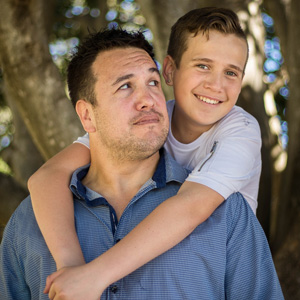Mindfulness for children
Simples ideas for parents
An effective way to treat and prevent childhood anxiety
© Caroline Witten-Hannah for Auckland Therapy Blog, 3 Dec 2018.
 What is Mindfulness
What is Mindfulness
Mindfulness is the very simply the art of focusing on the present moment: Learning not to worry about the past or what lies ahead but to be in the present moment.
A growing body of scientific research supports that mindfulness develops a set of life skills including focusing, quieting, seeing, reframing, caring and connecting. Having these skills enable children to relate to what is happening around them with wisdom and compassion.
Bringing Mindfulness into children’s lives from when they are very little and building on this as they grow up is a very effective way to safeguard against the development of anxiety.
Teaching Mindfulness to your Children
You can do this in your every day life in small ways. Things like:
Body awareness
Teaching your children to focus on their body sensations, their thoughts and their feelings. You can help them learn to do this from a young age by reflecting what you notice. Like: "You are looking a bit sad. I wonder what you were thinking about?" Also modelling this to children by talking about your own thoughts and feelings and how you calm yourself.
Developing this self awareness means a child can then take the next step to alleviate uncomfortable feelings and experiences and learn to speak them out, share with others, ask for help and calm themselves.
Bring calm
Smiling and laughter and giving lots of calm hugs and other gentle touches are great ways to slow children’s heart rates and bring calm.
Enjoy your surroundings
Stop and be aware of your surroundings and talk about what you notice and encourage children to share their experience of the moment. For example, if you are walking bring your child’s attention to the sounds you hear whether it be the birds or the traffic noise, the wind blowing the trees, the flowers and insects you see and so on. You can make this into a fun game.
Focus on here and now
Teach children to focus on the here and now. So if you are eating, for example, notice the texture and flavour of the food and focus on this. Make a game of seeing how slowly you can eat a mouthful and learn to appreciate the flavour of the food.
Breathe
Teach your children breathing and help them understand the calming effects of long, slow, deep breathing. You can do this as a family. This is a skill that will benefit your children in numerous situations throughout their lives; like when they get angry, afraid, upset and overwhelmed.
When children are upset help them learn to calm and relax by having them focus on their breathing and in particular exhaling with a long, slow out breath. When you breathe in your heart beats fast but when you breathe out your heart beats slowly. Help them understand this and feel the benefits of it.
Changing thoughts
Help children learn to change their thoughts. The more you practice this the better you become at doing it. So when children are worrying or upset suggest they change their thoughts from what is upsetting them to a sensation or a task or a word. So you might give them something to hold in their hand and squeeze, you might give them something to taste or smell and you might say a word that has a calming influence like sunshine or rainbow or their favorite colour.
Enjoy the process
You can enhance your children’s lives and wellbeing by helping them become mindful and to enjoy the present moment. Teaching yourself and your children mindfulness is simple and rewarding.
Learning these skills could be a great idea over the long summer break. There are many opportunities to make it fun and it will help you form a closer connection to your children.
There are a range of books about Mindfulness for children with easy activities to use. “Mindful Games” by Susan Greenland is a great book.
